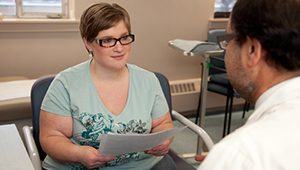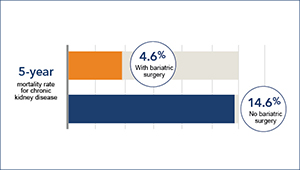Obesity
Research overview
“Obesity is the number-one health problem in the United States because it negatively affects our population’s health more than any other condition,” said Kaiser Permanente Washington Health Research Institute Senior Investigator David Arterburn, MD, MPH. Kaiser Permanente Washington researchers are doing practical research to learn how doctors, patients, families, employers, and policymakers can best work together to prevent and treat obesity.
“We’re focusing on three ways to halt the obesity epidemic,” said Senior Investigator Dori Rosenberg, PhD, MPH. “We’re helping to change obesity-promoting environments, bringing evidence-based prevention and treatment programs into health care systems, and helping people develop lifelong healthy diet and activity habits.”
Kaiser Permanente Washington obesity research areas include:
- reducing sedentary behavior and promoting physical activity and healthy diet in various age groups, populations with chronic conditions, and families;
- shared decision making to help patients find the best way to a healthy weight;
- implementing health coaches in primary care to support behavior changes;
- social networks that support lifestyle change programs;
- relationships between medications and genetic factors in developing obesity;
- health system, community, and national policies that address obesity;
- relationships between obesity and depression, diabetes, and other conditions; and
- long-term benefits and risks of bariatric (weight loss) surgery.
“Obesity is caused by many factors, so at Kaiser Permanente Washington, we’re working on many levels,” said Paula Lozano, MD, MPH, a senior investigator and Kaiser Permanente Washington’s assistant medical director for preventive care. “We’re improving health care to help people who are obese now. But since obesity is a societal problem, we’re also studying how to change our homes and workplaces and neighborhoods to create more healthy environments.”
Recent publications on Obesity
Arterburn D, Lewis KH Different Risks and Benefits Leading to Similar Costs After Sleeve Gastrectomy and Roux-en-Y Gastric Bypass 2021 Sep;4(9):e2122541. doi: 10.1001/jamanetworkopen.2021.22541. Epub 2021-09-01. PubMed
Buszkiewicz JH, Bobb JF, Hurvitz PM, Arterburn D, Moudon AV, Cook A, Mooney SJ, Cruz M, Gupta S, Lozano P, Rosenberg DE, Theis MK, Anau J, Drewnowski A Does the built environment have independent obesogenic power? Urban form and trajectories of weight gain 2021 Sep;45(9):1914-1924. doi: 10.1038/s41366-021-00836-z. Epub 2021-05-11. PubMed
Ma Q, Shambhu S, Arterburn DE, McTigue KM, Haynes K Interventions and Operations after Bariatric Surgery in a Health Plan Research Network Cohort from the PCORnet, the National Patient-Centered Clinical Research Network 2021 Aug;31(8):3531-3540. doi: 10.1007/s11695-021-05417-7. Epub 2021-04-20. PubMed
Test MR, Mangione-Smith R, Zhou C, Wright DR, Halvorson EE, Johnson DP, Williams DJ, Vachani JG, Hitt TA, Tieder JS. Obesity and health-related quality of life in children hospitalized for acute respiratory illness. Hosp Pediatr. 2021;11(8):841-848. doi: 10.1542/hpeds.2020-004531. Epub 2021 Jul 15. PubMed
Lewis KH, Arterburn DE, Zhang F, Callaway K, Wallace J, Fernandez A, Ross-Degnan D, Wharam JF Comparative Effectiveness of Vertical Sleeve Gastrectomy Versus Roux en y Gastric Bypass for Diabetes Treatment: A Claims-based Cohort Study 2021 May;273(5):940-948. doi: 10.1097/SLA.0000000000003391. PubMed
Researchers in Obesity
 David E. Arterburn, MD, MPHSenior Investigator |
 Allen Cheadle, PhDSenior Investigator, KPWHRI; Senior Research Associate, CCHE |
 Andrea J. Cook, PhDSenior Biostatistics Investigator |
 Maricela Cruz, PhDAssociate Biostatistics Investigator |
 Nicole M. Gatto, PhD, MPHPrincipal Collaborative Scientist |
 Beverly B. Green, MD, MPHSenior Investigator |
 Mikael Anne Greenwood-Hickman, MPHSenior Collaborative Scientist |
 Paula Lozano, MD, MPHSenior Investigator; Director, ACT Center |
 Dori E. Rosenberg, PhD, MPHSenior Investigator |
 Gregory E. Simon, MD, MPHSenior Investigator |











